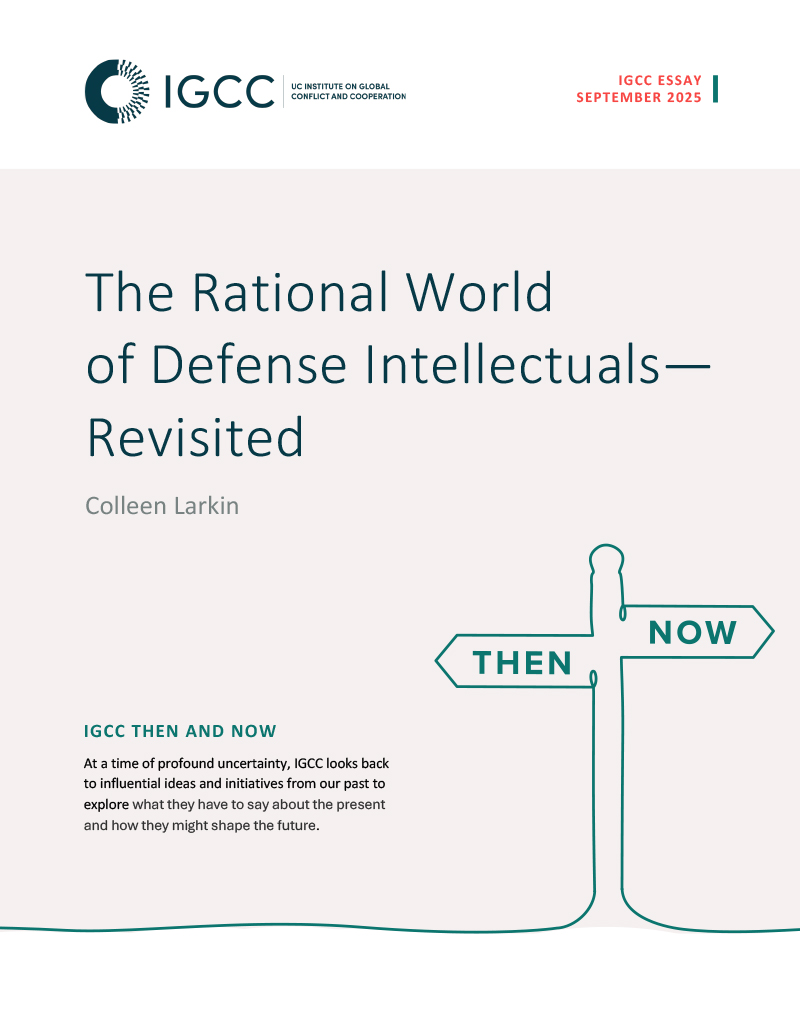The Rational World of Defense Intellectuals—Revisited

In August 1987, IGCC hosted the First Annual Conference on Discourse, Peace, Security, and International Security in Ireland. The conference produced a provocative working paper, Sex and Death in the Rational World of Defense Intellectuals, which provided a critical analysis of the nuclear strategy community’s use of specialized language. That language, argued author Carol Cohn—both euphemistic and chauvinistic—allowed intellectuals to put off grappling with the deadly consequences of nuclear weapons while maintaining a façade of masculine control over an otherwise uncontrollable domain. This groundbreaking paper gained wide influence, calling into question intellectuals’ claims of rationality and piercing the veil of how language shapes not only what nuclear strategists do, but how they think.
Four decades later, IGCC postdoctoral fellow in technology and international security Colleen Larkin reflects on how her first encounter with Sex and Death as an undergraduate student shaped her forays into the world of defense intellectuals. Larkin discusses how the paper influences her current research on the formation of strategic narratives and examines how Cohn’s Cold War-era insights are still highly relevant to today’s new nuclear age.
Chapter 1
My close encounter with the paper started in the winter of 2016. I first read Carol Cohn’s Sex and Death in the Rational World of Defense Intellectuals as a sophomore at Wellesley College, in a nuclear politics class. Even mere days into the course, I knew I had encountered nuclear strategy in the most unusual of circumstances—at a historically women’s college, in one of the few rooms anywhere in the world where conversations about nuclear politics took place entirely among women. The professor opened the class with a disclaimer that the technical language of nuclear strategy often involved euphemisms for, frankly, killing people—but we would read one author who would critique this practice.
This course was the beginning of my own journey of “obsession” with the world of nuclear weapons. As a child of the 1990s, the atomic bomb primarily existed as a distant memory in AP U.S. history class and a MacGuffin in many a James Bond and Mission Impossible movie. In my college political science classes, however, nuclear weapons stood out as uniquely important and terrifying. Reading works like John Hersey’s Hiroshima—a harrowing account of the bombing based on interviews with survivors—brought new gravity and tangibility to nuclear destruction. That the world could not only move on from such unthinkable destruction, but also make these weapons a central tool of world politics, seemed more than a little insane.
But back to Cohn. It is certainly not every day that an academic article makes you sit up straighter in your chair. Cohn’s piece was thrilling—peeling back a curtain where you never noticed there was one. Behind that curtain was a whole world. There was nuclear politics as bombs and planes and missiles, yes, but there was also the messier reality of the human beings who have to think about the unthinkable consequences of nuclear warfare. . .
To read Colleen’s full essay, download the PDF here.
Thumbnail image contains elements courtesy of Wikimedia Commons.